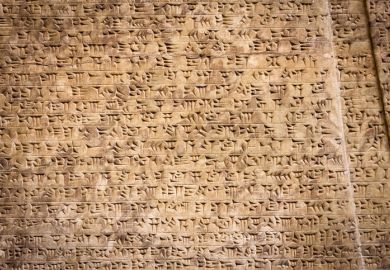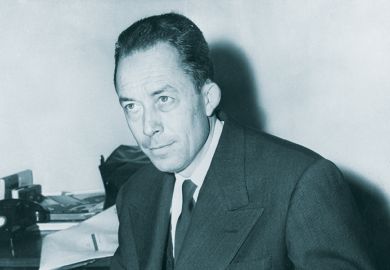How F. R. Leavis might have reacted to these and other centenary tributes may be inferred from his response, in the mid-1960s, to "that dreadful project of writing a book on me": "My 'life's work' has not only gone down the drain, but is being so sickeningly exploited and perverted by people I trusted that it would be insufferable to have the world reminded of it in any kind of public celebration."
Not that the tributes are lacking in reverence. But Leavis had, by then, so thoroughly identified himself as the persecuted outsider - his life's work, you might say - that he could thrive only on betrayal. This view is, of course, anathema to the disciples, to whom one can only reply that if Leavis is not paranoid, he will do until a paranoiac comes along. But the question of the Leavises' persecution mania (F. R. and Q. D. Leavis being as inseparable in this as in every other regard) has caused some confusion amongst disciples and opponents alike. It is surely wrong to suppose that had they been universally adored, all would have been sweetness and light. The Leavises did not suffer from lack of recognition; they devoted their considerable energies to securing precisely the responses they craved. Enemies were as necessary as disciples; they saw themselves as the embodiment of "minority culture", with increasing emphasis on the adjective. Praise withers under hostile scrutiny, but treachery will never let you down. And to identify yourself as public enemy number one in the world of letters is, implicitly, to present yourself as the world's greatest critic.
So to honour Leavis in terms that he would have found remotely adequate is a very tall order. But G. Singh has risen to the occasion in a hagiography beside which Ian MacKillop's recent F. R. Leavis: A Life in Criticism looks positively astringent. It is, indeed, hard to imagine what anyone who has read MacKillop's study could gain from reading Singh's. MacKillop at least gives us the life in context, along with the appropriate documentation, whereas Singh spurns even the humble page reference, which gives him the air of an acolyte displaying relics too precious to be fingered by the profane, and devotes himself largely to reverent paraphrase, of which the following sentence is, as its subject might have said, representative: "In a passage like this Leavis's lifelong contact with and the way he critically 'possessed' the various masters and masterpieces of English literature, and the incomparable insight they afforded him into the nature of the language and his sense of history and tradition are fully borne out."
Upon any reader with an ounce of spirit, the effect is bound to be the opposite of that intended. The Essays and Documents, presented by MacKillop and Richard Storer as "an aid towards clarifying the different contexts in which a case for Leavis might be made", must also be added to the pile of devotional works. The essays - on Leavis on Lawrence, Leavis and poststructuralism, Leavis and "Cambridge thought" - assert his continuing relevance to these and other topics. The documents consist mainly of old prac. crit. handouts, reading lists, essay topics and exam papers, buttressed by the recollections of his students. Leavis's own pronouncements, culled from supervisions at Downing, are, as might be anticipated, the highlight of the volume: "Virginia Woolf was representative of the Feminist movement that began in the late 19th century. Meredith started it, but it couldn't last, it's contrary to nature. Women aren't men, they aren't superior to men." Or "I don't think Meredith is read now - I disposed of him 30 years ago. He's dead now - he'll never come back - you can thank me for that." Or "They're not interested in literature at Oxford. I get letters from desperate under-graduates saying that they can't stand it any longer, and is there any way for them of getting into Cambridge? I tell them I can't get into Cambridge myself, so how can I help them?"
The disciples' case necessarily depends upon special pleading, since they are unwilling to settle for anything less than perfection. Leavis became his own worst enemy: the practical critic and charismatic teacher lies half-buried beneath the monster of Downing. For those outside the charmed circle, his cultural criticism is at best an embarrassment, and his attempts to define the canon by proscription have gone the way of all such endeavours. He is often praised for transforming criticism into a serious business, but to concede so much is merely to highlight the one-dimensional quality of Leavisite "seriousness", manifest in his dismissal of TristramShandy as "irresponsible and nasty trifling".
Behind the close reader stands the displaced preacher, who sought in reading a form of religious communion: puritan, antinomian, and exclusive. Hence the strenuousness, the relentless high-mindedness, the incapacity to recognise that any work which did not speak directly to him could possibly be any good. It was an example guaranteed to make converts of impressionable young readers in search of a vocation; it was equally inevitable, given his temperament, that in the end the reprobate amongst his congregation would far outnumber the elect. He might have been happier in the pulpit.
John Harwood is reader in English, Flinders University, South Australia.
F.R. Leavis: Essays and Documents
Editor - Ian MacKillop and Richard Storer
ISBN - 1 85075 564 7
Publisher - Sheffield Academic Press
Price - £35.00
Pages - 314
Register to continue
Why register?
- Registration is free and only takes a moment
- Once registered, you can read 3 articles a month
- Sign up for our newsletter
Subscribe
Or subscribe for unlimited access to:
- Unlimited access to news, views, insights & reviews
- Digital editions
- Digital access to THE’s university and college rankings analysis
Already registered or a current subscriber? Login



